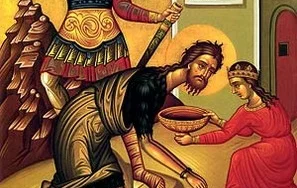Monday, August 29th, 2016- St. Mary Magdalene invited the Pan-Orthodox Flint area Churches to celebrate the feast of the Beheading of St. John the Baptist. Here is the text of the sermon, given by Fr. Gabriel, describing the important of this "little Good Friday".
Glory be to Jesus Christ!
Last week, we celebrated the leave taking of the feast of the Dormition of our Most Blessed Lady Theotokos. We spent those days proclaiming the holiness, of the greatest human being to ever walk amongst us. If the Theotokos is the greatest human being to walk the earth, then St John the Baptist, by Christ’s own admission, is not far behind her.
In the Gospel of Luke, we hear our Lord proclaim that among those born of women, there is no man greater than John the Baptist. St. Justin Popovich calls this feast a “little good Friday", because on Good Friday, men murdered the living God. Today, those same people murdered the greatest of all men.
St. Justin made this comparison in the feast days because so many of John’s greatest accomplishments in this world went hand in hand with the ministry of Christ. From his first days on earth, St. John was entirely dedicated to the One who would come after him. We hear very early in the Gospels how he leapt in his mother’s womb at the sound of the Theotokos proclaiming the incarnation. After that blessed encounter, Holy Scripture and Church Tradition teach us how he and his mother Elizabeth fled into the desert to escape the terrible decree by Herod, that all infants should be put to death. We know that forty days after that escape, his mother passed away, and his father Zachariah was put to death by Herod in the temple.
As an orphan and an infant, St. John was brought up in the desert, guided only by the hand of God. Take a moment to pause and think about that for a moment.
We can just imagine how difficult it would be for someone so young to be put out into the desert to fend for themselves. What kind of chance would they have? But John had the greatest of teachers, the greatest of guides. He was brought up by God the Father Himself who prepared John for his ministry that was to come.
When John the Baptist was about thirty years of age, the Word of God came to him, commanding him to preach repentance, and call on all men to prepare the way of the Lord. Shortly after the beginning of his ministry, having been preparing the Jews for the coming of the Messiah, the mysteries of the Holy Trinity were revealed to him when he baptized our Lord and Savior Jesus Christ. St. John slowly fell into the shadows and became silent.
He had accomplished what he was ordained to do in life--to prepare the way of the Lord. St. John did this with great joy, as we hear him say in the Gospels: “the friend of the bridegroom, who stands and hears him, rejoices greatly because of the bridegroom’s voice: therefore this my joy is fulfilled. He must increase, but I must decrease.” That last verse has some cosmic significance to it. We celebrate the Birth of John in June, right about the time when the days begin to get shorter, and the light
From Left to Right: Dn. John Manutes, Fr. Gabriel Bilas, Fr. Joseph Abud
of the sun decreases. We in turn celebrate the feast of the Nativity of our Lord in the winter, when the days slowly begin to get longer, and the light increases.
Shortly after the baptism of Christ, we know the story about how St. John was beheaded by Herod, and his earthly life ended. For many in the Christian world, this is where the story ends. The Orthodox Church however, celebrates this day as a new beginning, because we know that this was only the midpoint of the ministry of the beloved Forerunner of Christ.
Having departed the earthly life, St. John went down to hell itself, preparing the way yet again for Christ’s descent into Hades. He continued the ministry that he had performed on earth, preaching about the coming of Christ.
As St. John of San Francisco explains: “The souls of the righteous ones from the Old Testament, were languishing in hell, awaiting the fulfillment of the coming of the One Who would conquer the serpent, as had been told to Adam by God. These souls, deprived of the light of God’s glory, tormented with waiting for the fulfillment of their hope, were greeted by John, who brought joyful tidings in saying that soon…the kingdom of hell would be destroyed.”
And so, dear brothers and sisters, we celebrate today the beginning of St. John’s ministry to those who were in anguish in Hell. He brought those souls the joyous news of the end of their torment and prepared the way for Christ who would later shatter the gates of hell. Just as the Nativity of St. John is the beginning of the Gospel for the living, so too is the Beheading of John the Baptist the beginning for the dead.
In keeping with our Cosmic Theme, I will conclude this morning with the words of St. John of San Francisco who said:
“St. John the Baptist’s beheading was his final exploit on earth, and the last step for the receiving of the greatest reward, in the Kingdom of Heaven; For all those in hell, John’s death was the rising of the morning star, before the appearance of the Son of Righteousness.”

